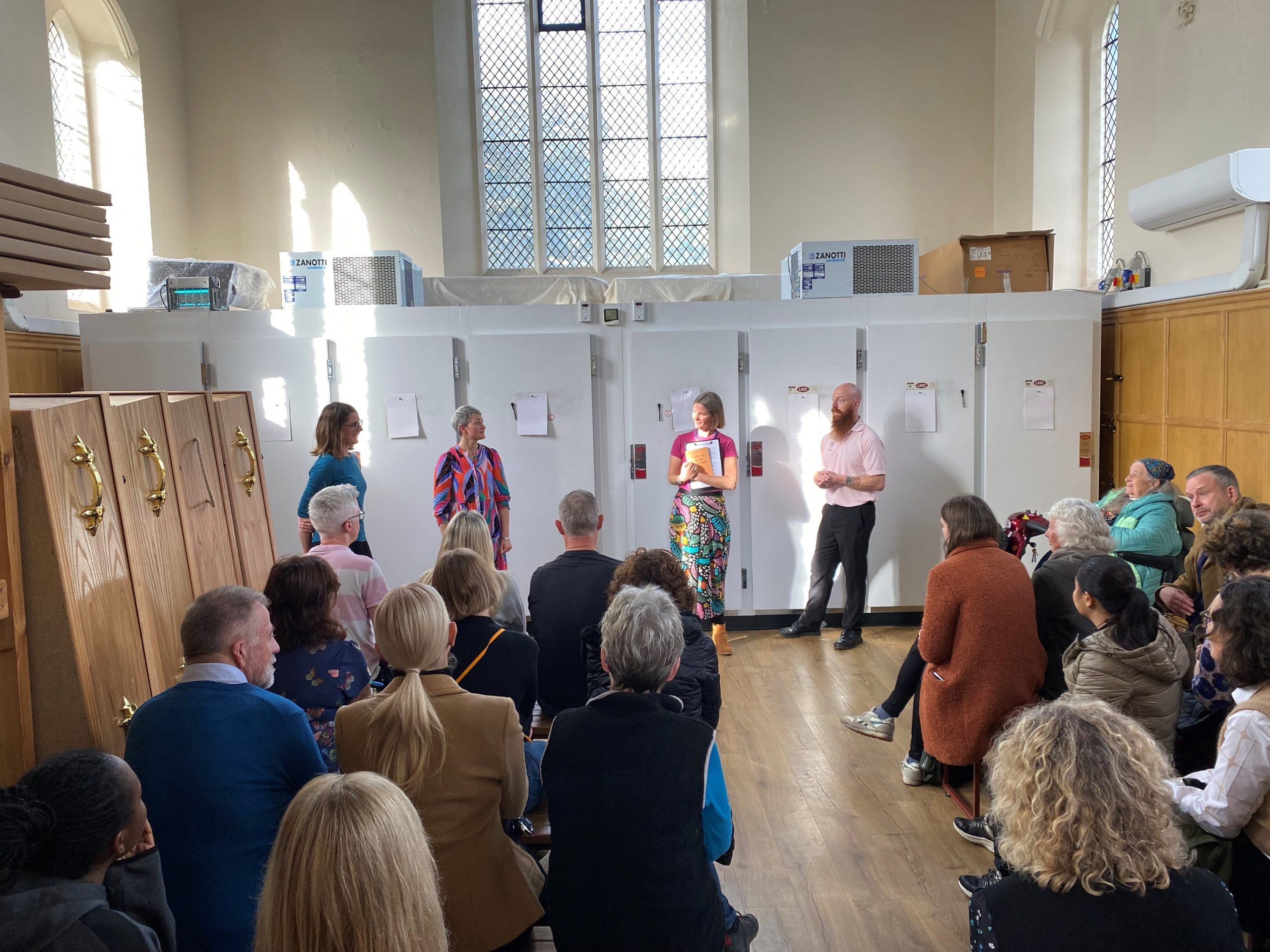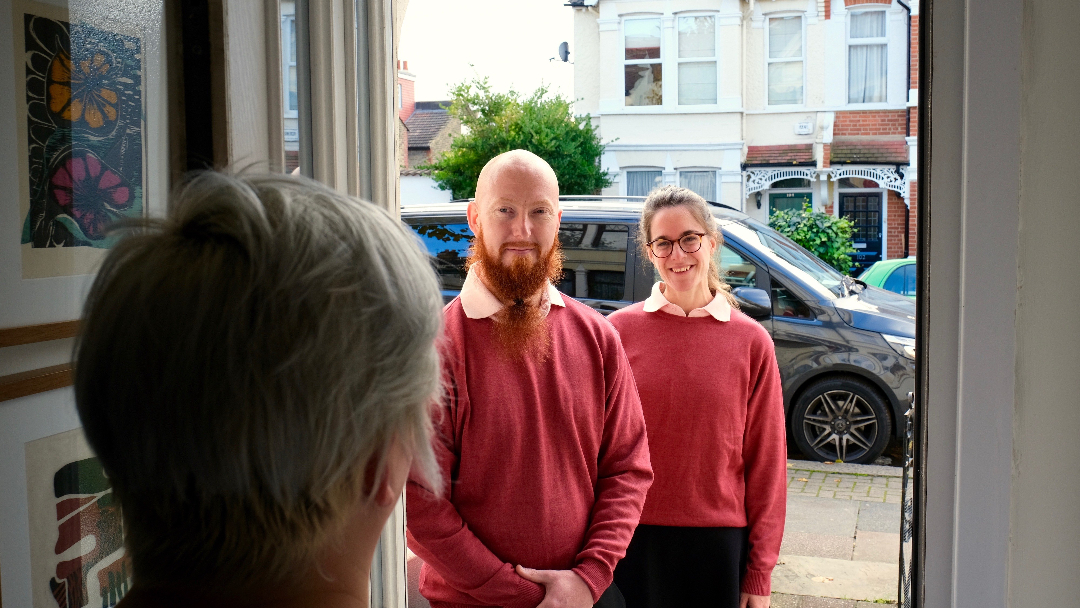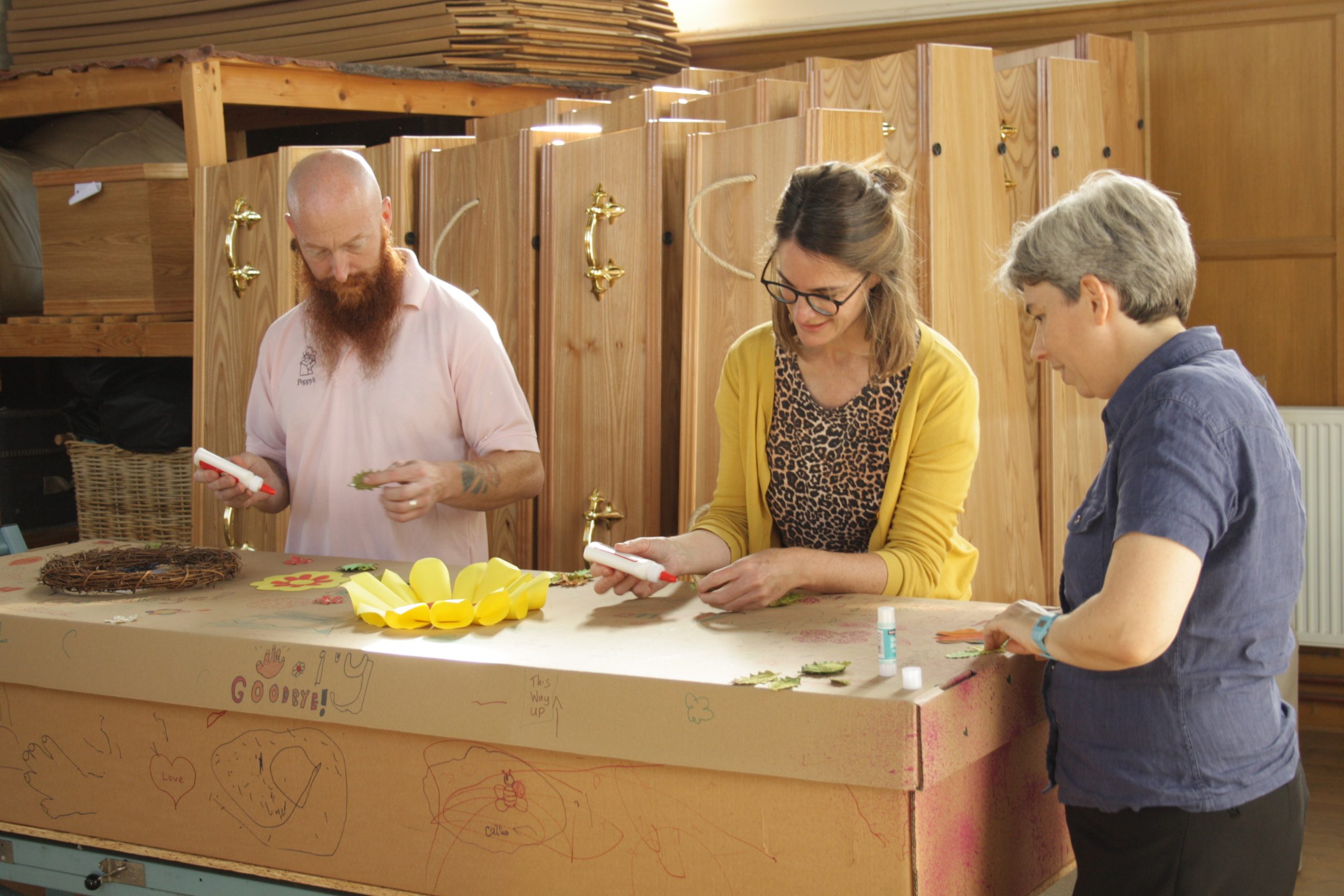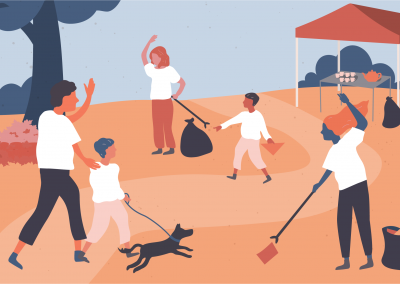Poppy’s
Bringing a more flexible, relational approach to the deathcare sector
A family decided that they wanted to visit their dead grandmother the day before her funeral. They gathered in the Poppy’s Friends and Family Room and sat together around her coffin. ‘When they arrived, they had this huge tin of scones with them,’ says Sarah Bax, Office Manager at Poppy’s. ‘They said Ah, she loved a cream tea. So I ran back to the kettle and brought this enormous brew over. And it was just the most normal thing, seeing them chatting over her coffin, eating scones, drinking tea.’
At the end of the family’s visit they decided they didn’t need a full funeral. ‘They said, We’re not going to come. We’re done. This was perfect. So there was no ceremony, no service. They changed all their plans at the last minute.’
Sarah describes this as an example of ‘a moment when a family realises they’re in charge.’
Redressing the power imbalance
This story gives a sense of the flexible, relational approach taken by Poppy’s, a South London business founded by Poppy Mardall. It wasn’t difficult to make tea and cancel the ceremony; what’s striking is that doing so even felt like an option, in the context of a sector where there is often a rigid, impersonal approach.
Deathcare is big business. We may not think about it much of the time, may not look twice at the high street funeral parlour, but it is a large mainstream industry that we all interact with from time to time. There is never a dip in demand and there are big profits to be made – especially if the public don’t know what they want or what it should cost.
‘Our sector has become so uncaring and dishonest and opaque’, Poppy says. ‘The dead become these corpse objects in body bags and the living become these weepy people who get patronised.’
For Poppy, the taboos around death and dying have led to a situation where families are doubly vulnerable after the death of someone close to them: shattered by grief and ripe for exploitation by funeral businesses. ‘People have basically no expectations and no power when the time comes,’ says Poppy. They are often told what they should want, what they should do and what they should pay, rather than being supported to understand and enact their own needs and wishes. ‘The funeral sector goes wrong when we think we own the body and we own the experience’, Poppy says. ‘We have so much potential power it’s almost scary
Being a relational funeral business is not just about being warm and humane with families; it’s about redressing an imbalance of power and equipping families to feel in control.
A link in the chain of support
‘Grief and death are among the few things we will all go through,’ says Poppy. Given this fact, it is strange how hidden and unknown the death care industry is, and how low and undefined our expectations of it can be.
The death of someone close to us can ‘upend our physical and mental health’, says Poppy, ‘in the short term and even permanently.’ The care and support we experience in that moment matters enormously.
A funeral director is one ‘link in a long chain of support that should be normal and accessible to everyone’, Poppy says, a smooth trajectory between different institutions and services ‘where you barely notice you’re moving from one support moment to the next’. But this isn’t the reality and the taboos and low expectations remain.
Open day at the mortuary

Photo credit: Poppy’s
To challenge taboos around death and build relationships with the local community, Poppy’s run regular open days. ‘We bring the public into the mortuary,’ Poppy says, ‘which is such a wildly taboo thing to do. An older couple might visit and be like, This is coming, we want to face it together. Or some younger millennials might come, who are just open-minded and progressive.’
Mortuaries are often bland buildings that don’t announce themselves. People pass them without realising what they are. Poppy’s mortuary is a Victorian burial chapel in the middle of Lambeth Cemetery, with tall windows and a high vaulted ceiling. Light pours in on the coffins and refrigerators. At any given moment, someone might be lining a coffin, engraving a name plate or getting a dead client dressed and ready for a funeral.
The open days are an example of the way that commercial sense and a relational approach can go hand in hand. Poppy’s build a relationship with their community in an open, generous way, providing an insight into a social function that is normally hidden. And because they’re transparent and trusted, people are more likely to choose Poppy’s.
A relational approach to dead clients
‘Our whole team is involved with the mortuary’, says Sarah Bax. ‘There’s no segregation; I’m the Office Manager, yet I’m over there all of the time.’
At Poppy’s, the relational approach extends beyond their living clients to the individuals they care for after their death. It’s easy to imagine what it means to be respectful towards the dead, or drily reverential towards them, but what does it mean to take a relational approach to someone after they have died?
‘I love washing the hair of people who have died,’ says Sarah. ‘That’s my favourite thing.’ In these moments, rather than mimicking interactions from another stage of care, the relational approach involves an ongoing appreciation for each person as a human being. ‘I don’t pretend to know the person,’ says Sarah. ‘I don’t chat to people or try to fabricate a narrative that feeds me. More likely I’m thinking that I’ve spoken to their mum on the phone, and that they’ve probably done amazing things with their life.’
Modelling this relational approach can itself break down taboos and help families feel the permission to interact the way they want to with their loved one. ‘There’s real care in the way we move people here, the way we turn them to get dressed, the way we wash their hair’, says Sarah. ‘What I love is when families are with us and they’re watching and they say I want to do it as well.’
Human and professional
The nature of our work is that we are with you for a maximum of six weeks. The relationship is quite short term and quite intense. We are a group of people who rise up in your life. You probably don’t forget us, but you probably don’t want to see us until you need us again.’ The Poppy’s team aim to be the ‘grounded, boundaried adults people need in that moment.’

Photo credit: Poppy’s
Boundaries are important when working in a context with so much trauma and emotion. ‘We’re completely human with you,’ says Poppy, but being relational doesn’t mean anything goes. As for great midwives or teachers or social workers, the professional and the human co-exist and map onto one another.
‘We occasionally get people calling us because they’re worried or stressed’, says Sarah. ‘We’ll give them time, but we’ll be clear that if there’s nothing to sort or solve about a specific question, then we will come back to them. We are not therapists and we would never venture into that territory. Giving people clear boundaries actually makes them feel safer and can help the process.’
Likewise the team make clear that they cannot resolve disputes and need families to work together to make decisions. ‘We have no problem stepping out of meetings if people are upset with each other,’ Sarah says. ‘I just say I’m going to print something and that gives them a moment to pause and catch their breath.’
We’re alongside people during a difficult period, we’re not in it with them. We’re right by their side to get them through this initial period in a way they feel proud of themselves for.
Talking about difficult things
Clear boundaries are accompanied by a commitment to honesty and transparency. This involves talking openly about difficult things – death and care for the dying, but also another social taboo: money. ‘We always talk about money the first time we speak to a family’, Poppy says, noting how ‘refreshing’ people find this in a sector where pricing is often opaque and inflated.
The team also commit to sharing the information families want about the person who has died – something it can sometimes be hard to access, especially if a death is violent or unexpected. Information and visits are withheld by some mortuaries, leaving families confused and frustrated. Finding someone who will be open and honest can be a huge relief.
Sarah describes a situation where a man’s body was in very poor condition, but the family still wanted to visit. ‘We never say no, whatever the condition’, she says, ‘but we always explain very clearly what to expect and what the person looks like.’ In this case, Sarah had prepared a script and shared information with the man’s sister gradually, asking at regular intervals whether she wanted more detail. ‘I didn’t hide anything’, Sarah says, ‘and the relief she felt! She said she’d been begging the coroners to tell her what her brother looked like, but they wouldn’t let her visit and they wouldn’t send photos. And now, suddenly, she had control and ownership’.
The man’s sister decided to visit him and she was able to recognise a few details and say, ‘Ah, this is him.’
Staying human and open hearted
It is not uncommon for behind-the-scenes work in mortuaries to be permeated by dark humour – not necessarily out of disrespect, but as a way of dissociating from the difficult realities of the job. At Poppy’s, all team members stay close to that reality. ‘It’s not our sadness’, says Sarah, ‘but it’s okay to feel sad. We name it and allow ourselves to have reactions.’
There is an art to staying well in such an emotionally charged environment.
We know that the hero model doesn’t work. How do we stay in service in a way that means we can be sustainable? How do we stay human and open hearted without suffocating amidst other people’s anxiety and terror?
The team sit in one office together, in the gatehouse of Lambeth Cemetery. They can hear if someone else is having a difficult phone call. They check in with each other when someone gets back from a funeral. They take time out to talk or to walk around the cemetery.
‘We have our hands on the backs of our living clients,’ says Poppy, ‘and we need people’s hands on our backs and they need people’s hands on their backs’. There have to be ‘concentric rings of support’, layers of relationships through which the intensity of the work can be distributed and diffused, and everyone involved can feel supported, heard and held.
Structure and space
Although the experience for clients at Poppy’s is structured and boundaried, there is space for them to work out and express their unique hopes and needs. The service for families is consistent – but consistently open and responsive. As such, the outcomes can look radically different.
If the norm in the sector is to funnel families down standard, pre-defined pathways, the relational approach at Poppy’s throws things wide open, encouraging and celebrating the diversity of people’s wishes.
On one call, a family mentioned that their dead relative would probably love to have arrived at his funeral in an old London bus. The team didn’t promise anything, but they went away and managed to organise a double decker bus to take the coffin and the mourners to a natural burial ground.
‘If it’s legal and it’s possible, we’ll do it’, says Poppy. Within the team, there’s a willingness to be surprised and an emphasis on trying to find a way through for each family. ‘That’s why the people who work with me come to work,’ Poppy says. ‘They’re not looking for generic service delivery.’ She talks about being in service to their clients, rather than offering them a service.
Managed, controlled flexibility
The team aim for ‘managed, controlled flexibility’, Poppy says: a quality required recently when an older woman woke up ill on the morning of her husband’s funeral and called to say she wouldn’t be able to attend.
Instead of proceeding without her, the Funeral Director, Hannah, made some calls and, within half an hour, had changed plans. Rather than gathering at the church, the congregation, the coffin and the vicar met at the woman’s house. The funeral service took place in her living room.
‘That quick change, that ability to even think we can do this, is incredibly human,’ says Sarah, ‘but it was done very professionally. It wasn’t like Let’s chance it and have a go.’
Decorating a coffin

Photo credit: Poppy’s
‘I came in one day to find a family decorating a coffin,’ Poppy says. ‘We have this room where families can do that, and there’s often glue and glitter on the floor. On this occasion, a dead woman’s grandchildren were there and they had all drawn octopuses on the coffin. It was just covered in these joyful, multi-coloured drawings of octopuses.’
A colleague asked them, ‘Did your granny really love octopuses?’ And a child said, ‘No, someone drew an octopus, so then we all drew octopuses.’
Poppy gives this as an example of the kind of thing that can happen ‘if we can shed that sense of what we should be doing’ and instead be real and human, and even playful, in a space that is often formal and uptight.
Here, instead of being expected to be quiet and sombre, a group of children were celebrating their grandmother with noise and joy and fun.
Reflection questions
Digging deeper
- What difference does a relational approach make in this example?
- What distinguishes a relational approach from ‘good customer service’ here?
- How does an emphasis on boundaries support relational work in this example?
Applying the learning
- What taboos or conventions might prevent people in your sector or context from acting relationally? How could you overcome these?
- How can you ensure ‘concentric rings of support’ exist in your place?
More stories
The Relationships Map
The Relationships Map is a space for anyone who believes in the importance of relationships to find one another, share ideas and resources, feel part of something bigger, and realise more than the sum of our parts.









